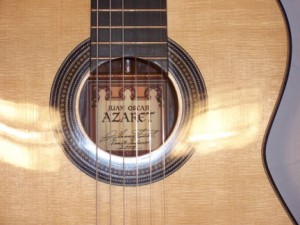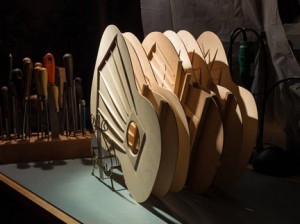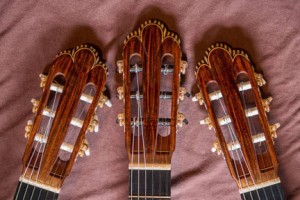Classical Guitar Brings NECC Students Together
Can students of physics, engineering, and music find a common bond in the classical guitar?
Northern Essex Community College engineering professor Juan Oscar Azaret of North Andover thinks so and he has designed a one-night workshop and presentation to prove it. “Curriculum Crossroads” will be held Wednesday, March 9, at 6:30 p.m. in the Hartleb Technology Center on the Haverhill campus, 100 Elliott St. the event is free and open to the public.
An engineer of 35 years, Azaret is also a classical guitarist and luthier (someone who makes or repairs string instruments) and a long time board member of the Boston Classical Guitar Society. Multitalented, Azaret has a multi-faceted appreciation of the classical guitar and believes others can too.
This idea that the classical guitar and the sound it produces can be of interest to students of varied disciplines was the catalyst for this event. The evening is designed around the idea of “the art and science of the classical guitar,” Azaret says, through performance, perception, design, and acoustics.
“This project will provide a vehicle for students in each of these fields to appreciate certain foundations and applications of their studies as they relate to each other,” he says. “We want them to be interested in the academics of it, but entertained as well.”
Working together with NECC physics professor Dr. Il (Johnny) Yoon, special laboratory and research assignments will be spawned from this presentation allowing the students to broaden their understanding.

A Juan Oscar Azaret original created by NECC engineering Professor Azaret. Partially constructed guitars will be shown during the “Curriculum Crossroads” presentation.
The program will include performances of classical guitar works by Robert Ward, a professor at Northeastern University and Brookline Music School and concert guitarist. The focus will be on the music and how “beautiful and approachable music” is created on a classical guitar as well as how guitars are created. Partially constructed guitars will be available to show the anatomy of the instrument.
The second half of the night will be dedicated to examining sound. Specifically the science and engineering that creates the sound. Participants will be able to “see” sound through the use of a spectrum analyzer, oscilloscope, and vibrating string lab set-ups in an interactive audio visual presentation.
“It will link the instrument, the performer, the music, and the listener,” he says.
This presentation is funded, in part, through a new Academic Innovations Mini-Grant which was created by the college to encourage curriculum innovation.
“Educators submit programs that show they are engaging students in different ways to give them a broader, richer experience,” Azaret says.
Students from NECC’s physics, engineering, and music classes will be in attendance, and the public is invited to attend.
For additional information contact Juan Oscar Azaret at joazaret@gmail.com









